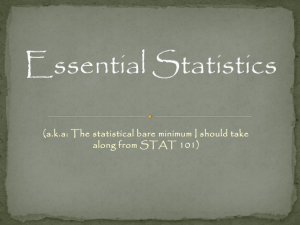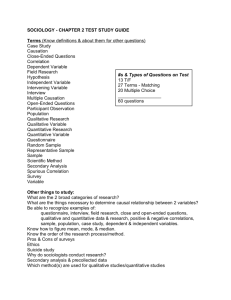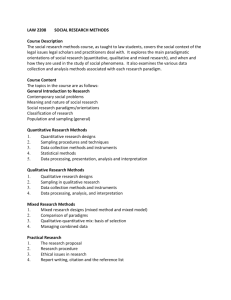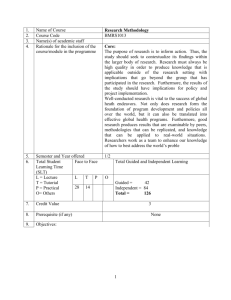EDUC8631 Approaches to Research - Day 1 ( version
advertisement
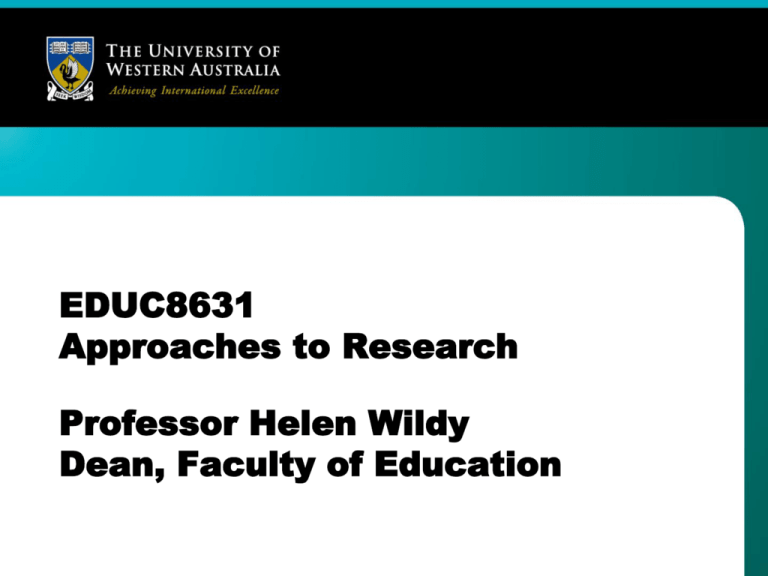
EDUC8631 Approaches to Research Professor Helen Wildy Dean, Faculty of Education Session 1 Introduction Session outline • What is research? • Why do educational research at all? • Where do research questions come from? • What makes a good research question? • Your research proposal What is Research? • Creative work undertaken systematically to increase the stock of knowledge (of humanity, culture and society), and the use of this knowledge to devise new applications (OECD) What is research? • activity classified as research is characterised by originality • investigation is a primary aim • results are sufficiently general for humanity's stock of knowledge (theoretical and/or practical) to be recognisably increased • includes empirical and non-empirical work Educational Research Small group discussions Groups: Why read educational research? Groups: Why do educational research? Prepare to report 2 or more reasons • Why read educational research? – Notions of evidence-based practice • Why do educational research? – Add to the stock of knowledge in the discipline Where do research questions come from? • Three main sources of research questions – Previous empirical and theoretical literature – Professional experience – Everyday life • Example: school restructuring – theorising, evidence of impact, school principals WA • What makes a good research question? FINER framework • In selecting your research question consider whether or not it is: – – – – – Feasible Interesting Novel Ethical Relevant Activity • Select one of the FINER topics • Prepare a research question that does NOT meet that requirement • Share in pairs • Discuss which requirements are easy to meet, and which are easy to break? Assessment: a research proposal • The main assessment for this unit is the preparation of a research proposal • This MAY be a proposal for later research (Major paper or thesis) • We believe the best way to learn about preparing for research is to practise preparing for research Your Research Proposal • The What and Why section (Conceptualisation) – What you intend to achieve – Why this is important • The How section (Design) – How you will address your aims/questions Stages of conducting research: Conceptualisation and Design Data Collection Analysis, Interpretation, Reporting • Write some notes about your field of research interest • Be ready to share Overview of the unit • Day 1 Building blocks • Day 2 Quantitative research • Day 3 Qualitative research • Day 4 Quantitative and qualitative research Session 2 Key concepts Session 2 outline • Variables • Data • Relationships • Measures of variables • Hypotheses • Quality • Sampling • Some concepts used more in quantitative research than in qualitative research • Good starting place Variables • Variables are phenomena that can vary – – – – – – Height Age Students’ reading ability Attitude to learning Number of fire trucks attending a fire Shoe size • Distinguish between variables and their attributes – Variable: sex; attribute: Male – Variable: temperature; attribute: 11 degrees Variables can be measured • If a phenomenon varies then we can observe that variation and develop an instrument to measure the variation • What instruments do we use to measure: – – – – – – Height Age Distance Students’ reading ability Attitude to learning .... Data • The instruments used to measure the variation of variables give use data • The data are numerical (how much, how many, how long, to what extent .....) • These data are quantitative data, or hard data • So we talk about quantitative research • Later we will talk about research that involves soft data: qualitative research Relationships • The aim of quantitative research is to find relationships between variables • What do we know about the relationship between – height and age? – age and reading ability? – reading ability and attitude to learning? • Identify a relationship that is of particular interest to you in your work Correlation Co – relationships can be – Strong or weak – Positive or negative Strongest (perfect) positive correlation is +1 Strongest (perfect) negative correlation is -1 No correlation (unrelated variables) is 0 A weak positive relations is 0.2 A weak negative relationship is -0.2 • But does a relationship mean that one variable causes the other? • This is a big issue in research – Does change in height cause change in age? – Does change in age cause change in reading ability? – Does change in reading ability cause change in attitude to learning? – Does change in shoe size cause change in reading ability? Correlation and causation • Correlation (co-relation) does not always imply causation • When variables vary together (co-vary, corelate) they may not have a causal relationship Consider direction – A causes B, eg smoking and lung cancer – B causes A, eg height and age Spurious relationships • When a relationship exists due to both being correlated to a third variable – shoe size and reading ability (age) – ice creams sold and use of air conditioners (temperature) – source of news (TV, print) and level of knowledge (cognitive skill) – marital status and suicide (sense of belonging) Or no relationship at all, eg income and street number Causal and non-causal relationships between variables David Hume’s criteria for causality : 1. Contiguity - nearness or contact between the 2 variables 2. Temporal precedence – the cause variable happens before the effect variable 3. Constant conjunction – the 2 variables always happen at the same time • Check these with examples • Independent variable – the predictor variable • Dependent variable – the outcome variable Independent variable Dependent variable Age Reading ability Reading scores at age 7 Reading scores at age 10 Rainfall Number of umbrellas used Measure of variables • Types of measure – categorical (eg colours) – ordinal (can be ordered, eg never, rarely, sometimes, frequently) – interval (difference between eg 2 and 3 has the same meaning as the difference between 26 and 27) – Ratio (has a zero value) • Most statistics need interval level data Hypotheses • Hypotheses are statements of causal relationships between two variables • The Null hypthesis states that no relationship between the two variables exists • Researchers accept or reject the null hypothesis (there either is or is not NO relationship) • Alternative hypotheses are then explored. • Researchers NEVER prove hypotheses; researchers are cautious How good is my research? • The main idea is validity • Two kinds of validity – Internal validity – External validity Internal validity • How well can a cause-and-effect relationship between two variables be inferred? • Depends on the strength of the research design External validity • To what extent can my cause-effect relationship be generalised to other populations - persons, places, times • Depends on the sampling methods used Sampling Two different approaches: Probability-based Non - Probability-based Probability-based – Each person from the population has the same chance of being included in the sample – Simple random sampling procedures (random number generation) – Stratified random sampling (identify subpopulations of interest) Non-probability-based – Convenience sampling (grab anyone willing) – Snowball sampling (ask respondents to nominate others to participate) • What variables or constructs are relevant to your research? • How would you operationalise them? Session 3 Paradigms • This session deals with how we know what we know • Activity: In pairs, identify 3 things related to education that we know for certain Session 3 outline • Ontology • Epistemology • Methodology Ontology • The nature of reality: what is its form and nature? • Ontology –the nature and structure of the world • The study of the nature of existence, the science of being Epistemology • The nature of knowledge claims: what counts as valid knowledge? What is the relationship between the knower and the known? • Epistemology - the nature of human knowledge Methodology • How we inquire into the world to build knowledge about the world: how does the inquirer go about finding knowledge? • Methodology – the principles and procedures of inquiry Alignment • Ontology, epistemology, methodology must align with research aim and research questions • Paradigm – net of epistemological, ontological, and methodological premises that guide research actions • Examples, a belief that there are multiples versions of reality (ontology) is aligned to believing that researchers can ask people to talk about their version of reality and that there are many different ways this can be interpreted. Unstructured interviews are appropriate ways of obtaining this information Quantitative Research • Ontological – Existence of objective, absolute truths – Focus on operational definitions and rational explanations • Epistemological – Researcher (knower) and object of study (known) independent – focus on objectivity – Assumption that inquiry can approximate objectivity (value-free); disagreements between observers due to errors and/or observer biases • Methodological – Replicability as a means for testing truth – Focus on generalization – Criteria – notions of internal/external validity Qualitative Research • Ontological – Reality is local and specific – Constructions cannot be absolutely true or correct (but can be less sophisticated/informed) – Reality actively constructed rather than discovered • Epistemological – Researcher and object of study inherently dependent – Inquiry inherently value-bound – Multiple interpretations can be equally valid • Methodological – Focus on induction – Relative lack of emphasis on generality – use purposive samples – Criteria – trustworthiness, credibility, transferability, confirmability Types of Research Questions • Empirical and non-empirical • “Quantitative” and “qualitative” questions Class Exercise: Classifying Research Questions • What is the effect of cooperative learning methods on mathematics achievement in sixth graders? • What are the perspectives of primary level teachers on using suspension as a behaviour management strategy? • What is the relationship between severe behaviour problems and academic performance? • How do English teachers deal with students with disabilities in the secondary level classroom? Session 4 Your research interest • Take a few moments to reflect on your research interest. Write two good paragraphs to indicate – Your general area – A particular problem, question – Your inclination towards a paradigm • Prepare to share your ideas • Ask for feedback: To what extent is your writing – Convincing – Coherent – Concise Small group task • In turn, report to your group on your initial research idea
